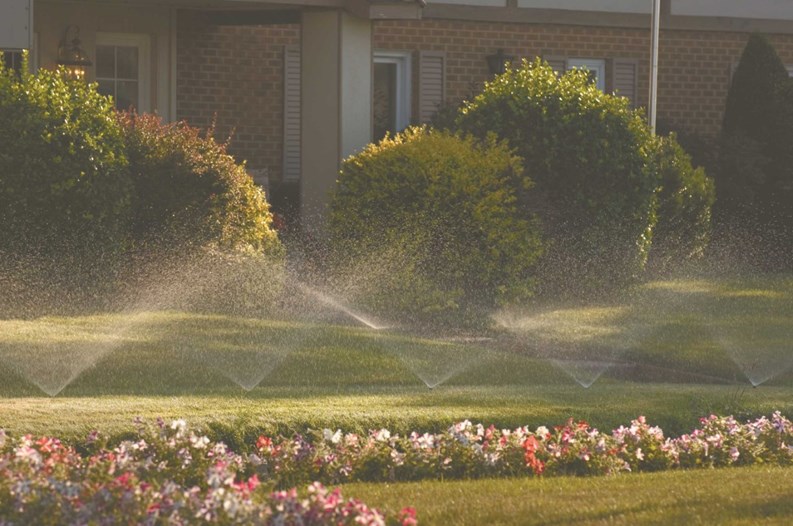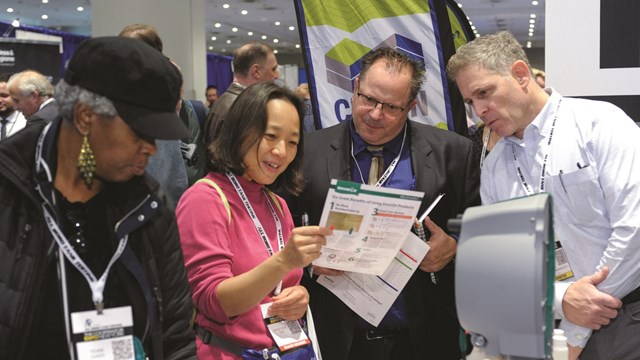One of the first things both prospective residents and visitors to a condo or HOA notice are the beautiful grounds and lush landscaping surrounding the property. Of course, a key component in maintaining all that greenery is the availability of fresh water. Because of the topography of New Jersey, access to water can vary a great deal depending on where a home is located—one property may have drought-like conditions, while another just a short distance away may struggle with drainage issues.
Because of this variance, it’s almost always necessary for buildings and HOAs to use some type of irrigation technology to keep their lawns, trees and shrubs healthy and green. Anyone who has ever lived in a condo has probably seen the sprinklers go on and off, and while it's easy to take this technology for granted, utilizing the proper system and controlling water levels for all areas of the property can be a big challenge.
“Whether you are dealing with flowers, trees or shrubs, they all have different watering requirements, which are influenced by a building’s location, soil type and site topography,” says Rick Landgraber, president of Elite Landscaping Inc. in South Plainfield. “So it's vital to know how, when and where to water and what kind of irrigation equipment supports the microclimates found throughout condominium properties.”
New & Improved
In the past, associations may have relied solely on sprinkler systems or gardeners to water the property with hoses, but irrigation systems have come a long way since those days. Today’s watering technology is cheaper, greener and much more sophisticated. Long gone are the days when installers would drop pipe into the ground, figuring that spraying around large volumes of water would make up for haphazard installation.
Modern irrigation controllers have become extremely sophisticated, thanks to the integration of computer technology to improve system timing and diagnostics. The controller still needs to be connected to every valve with a bundle of dedicated buried wire, but according to the pros, the improved accuracy and conservation make up for the more complicated installation.
Daryl Elder, project manager for High Tech Landscapes in Branchburg, works frequently at condos and HOAs and says a lot of these have older systems that run on several different clocks and should consider updates.
“One of the newer systems that’s out now is known as a two-wire system, you can use a single clock in one location and it makes things a lot easier to adjust and set up watering cycles,” Elder says. “Obviously, if you want to turn the system off, you can just turn the one clock off. There’s a decoder in each valve box so the valve is turned on from the clock. We recommend that for any new installations.”
The programmable valve is another innovation that uses no electricity and is being tested by some area landscapers. The valve can be programmed to open and close in any combination of settings based on how often the water is turned on. The valve is small enough to be installed under a sprinkler head, or in another version can be used in a water line. This innovation means that each sprinkler head can be programmed to open independently of others in the same zone, and multiple heads can be staggered to open and close at different times in order to distribute water more evenly and efficiently.
Materials have also changed a lot in recent years, with newer sprinkler heads designed to last longer. Spray head sprinklers are designed for more durability and uniform watering and are ideal for lawns, flowerbeds, and shrubs. Meanwhile, new plastic valves are constructed for reliability and are easy to install in multi-valve systems.
“Heads are more durable and nozzles are now interchangeable and can be adjusted, as opposed to nozzles that need to be switched out when you’re trying to get a different spray pattern,” Elder says. “Years ago clocks would warp, but everything is electronic now and computer-controlled, so they have also gotten much better.”
Advice From the Experts
For an HOA or condo considering changing out its landscaping and irrigation methods, it’s important not to just rely on the first company you talk with. Things have changed so much and there’s so much that can be done today, it's important to shop around to make sure the contractor you're working with is the best fit for your community, and that you're getting the right system at the right price.
“Usually, there’s an irrigation designer involved, and they will do the designing of the system,” Elder says. “We will recommend a system based on what the [building or association's] pressure is, and whether they use city or well water, and go from there. It also depends on how many zones are in the system.”
As much as irrigation science and technology has improved in recent years, a qualified, competent specialist is still needed to assess your property's unique topography and water-related challenges. Different zones within a single property require different approaches and equipment when it comes to irrigation.
For example, many HOAs have areas in between their buildings where swales build up, making it important to install heads in the areas between the houses to help this. “You may not want to water those areas in the same way, so we normally recommend to separate those areas,” Elder says. “You want to keep heads in certain areas where the sun may not hit and need a lot of water.”
And a property may not stay the same from year to year. Trees may have been added or removed, shrubs and plantings may come or go, and it's important for the turf to be evaluated after any major landscaping alteration in order to determine whether the property's irrigation pattern needs to be adjusted to account for the new layout.
Irrigation By Seasons
An irrigation contractor will do more than just put in sprinkler heads and clocks; they will work with you throughout the year to ensure that the landscaping is looking its best at all times. Richard Harber, president of Quality Irrigation in Manalapan, specializes in the design, installation and maintenance of residential and commercial irrigation, and says that each season requires checks to an irrigation system, so it’s important for communities to plan ahead.
In the spring, all drain valves and plugs should be closed to look for any leaks in the system. Each individual zone should be checked, and all heads cleaned and adjusted to maximize efficiency. Once everything is done, the system is reset for proper zone coverage, and the control time is reset for optimal spring watering needs.
“Once summer comes, adjustments are made as shrubs, beds and lawns begin to grow,” Harber says. “Individual zones are checked and heads are readjusted. Timers and rain sensors are set for optimal summer performance, as more water is often needed.”
When the cold weather comes around, valves and drains are shut off and compressed air is pumped into the main lines, valves and heads to ensure the system is completely water free. “This prevents frozen pipes and valves that can crack and break during the winter,” Harber says. “The control system is also disabled for the season.”
Licensed & Insured
Before hiring someone to fill your condo or HOAs irrigation needs, it's important to make sure that the company you're engaging is licensed and insured and has met the state's irrigation guidelines.
According to the State of New Jersey Department of Environmental Protection (NJDEP), a landscape irrigation contractor must be certified by the Landscape Irrigation Examining Board to perform the construction, repair, maintenance, improvement and alteration of any portion of a landscape irrigation system, including required wiring within that system and connection to the required power supply and the installation and connection to a public or private water supply system under the terms and conditions of a contract.
A landscape irrigation system is any assemblage of components, materials or special equipment which is designed, constructed and installed for controlled dispersion of water from any safe and suitable source, including properly treated wastewater, for the purpose of irrigating landscape vegetation or the control of dust and erosion on landscaped areas, including integral pumping systems or integral control systems for manual, semi-automatic or automatic control of the operation of these systems.
Eric Zima, owner and president of North East Irrigation, which provides irrigation services to condos from New Jersey to New Hampshire, says that dealing with water issues can include interacting with both environmentalists and government legislation.
“Water is becoming an ever-more precious resource,” he says. “Everywhere we look we’re starting to see restrictions being put in place. So while on one hand we want to promote conservation of precious water resources, on the other it becomes ever more of a challenge to keep the grass green.”
Common Mistakes to Avoid
Even when associations and contractors try to be as thorough as possible when installing or updating an irrigation system, there are a few common missteps that can hinder the efficiency of even the most technologically advanced systems.
“One of the mistakes HOAs make when irrigating their landscaping is planning ahead,” Melissa Barbieri, the marketing manager for By Design Landscapes in Metuchen, says. “The varieties of the plant material will most likely be juvenile at the time of installation. The projected mature sizes of this plant material must be taken into consideration when planning for an irrigation install.”
“For instance,” she continues, “it is very common to see pop-up spray heads installed just in front of the newly installed foundation or common area planting displays. Over time this plant material will grow along with the size of the bed lines with annual maintenance. Associations incur additional costs to move these heads at a later time once the plant material begins to fill in and become more mature,” Barbieri says.
While smart water sensor technology can improve the look and longevity of landscaping incredibly, it can become counteractive if installed in the wrong location.
“Additionally, rain sensor locations must be carefully selected, preferably in open areas or along roof lines,” Barbieri says. “More often than not, rain sensors are placed to be hidden in a mass of foliage. Once tree canopies in these areas begin to mature, they tend to block the sensor from receiving the inclement weather, thus not telling the system to turn off during this time period. This often results in very wet and soggy turf and planting environments which destroys plant material and manicured turf.”
Lack of water well testing is another common irrigation blunder made by associations. “In the event that a well will be used as a water supply, it is very important to have the water tested,” Barbieri says. “Throughout many areas throughout New Jersey, it is very common to see high iron content in well water. In the event that this is the case, consideration of the installation of a water softening system should be made. This will prevent against the reddish brown discoloration to hardscape features such as sidewalks, building foundations and fence lines.”
Final Thoughts
Any condo or HOA that wants to attract more people and maintain (if not increase) property values needs to take the health and efficiency of their irrigation program into account. “When done properly, it really does keep a property looking nice,” Elder says. “A lot of people think they may not need it, especially during the rainy season, but it really can do wonders.”
“Adding a new irrigation system is one of the best investments that an association cam make,” adds Landgraber. “Using features such as ET controllers, drip irrigation, and precision nozzles, your irrigation system can save you money on your water bill and lead to healthier turf, healthier plants, and greater curb appeal.”
Keith Loria is a freelance writer and a frequent contributor to The New Jersey Cooperator. Editorial Assistant Enjolie Esteve contributed to this article.





Leave a Comment